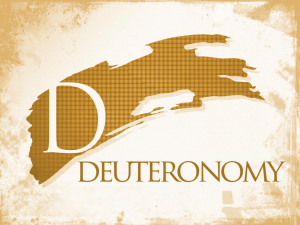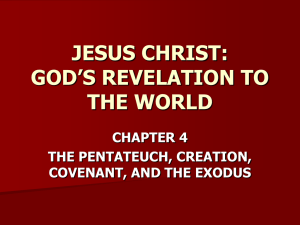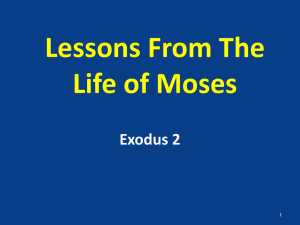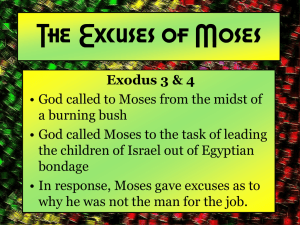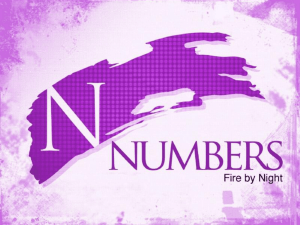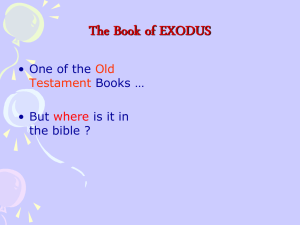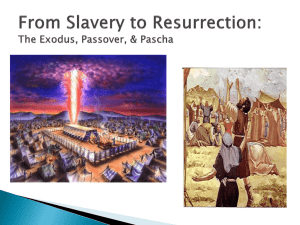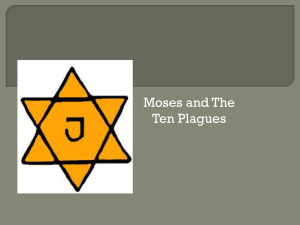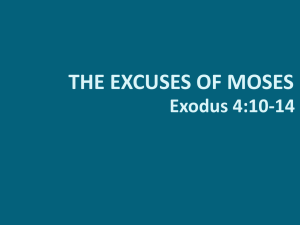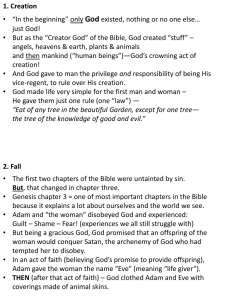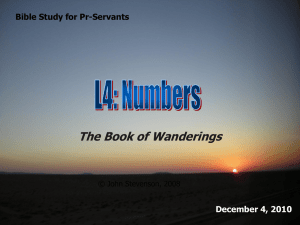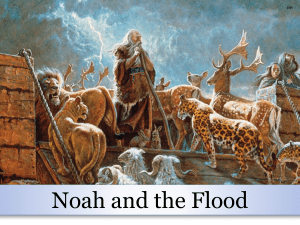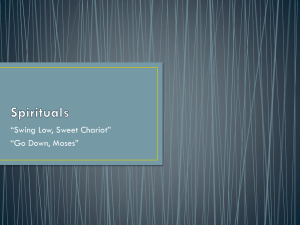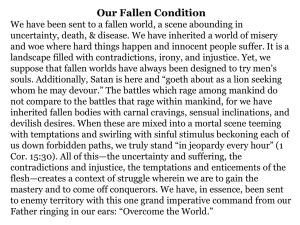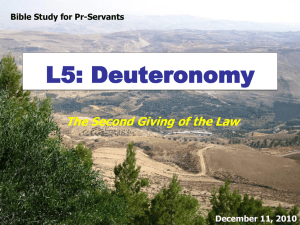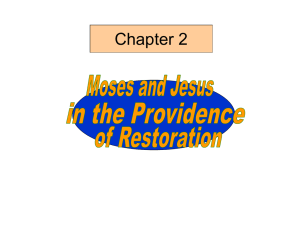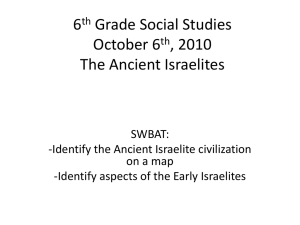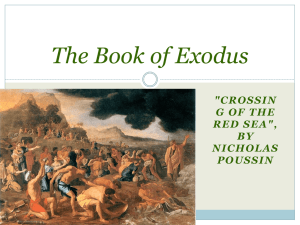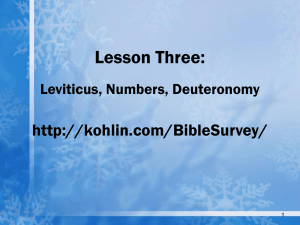Lordship & Lostness
advertisement
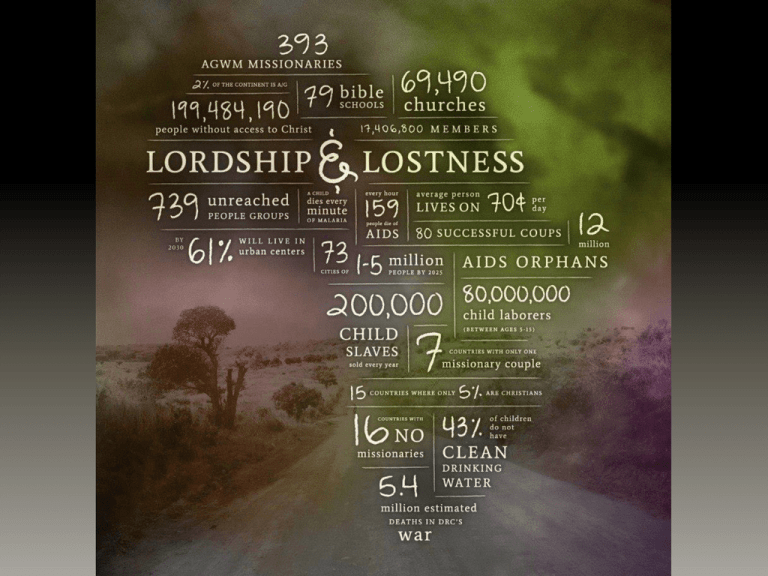
A message by a friend in the Muslim world Text: Exodus 3:1-10 Now Moses was tending the flock of Jethro his father-in-law, the priest of Midian, and he led the flock to the far side of the wilderness and came to Horeb, the mountain of God. 2 There the angel of the Lord appeared to him in flames of fire from within a bush. Moses saw that though the bush was on fire it did not burn up Text: Exodus 3:1-10 3 So Moses thought, “I will go over and see this strange sight—why the bush does not burn up.” 4 When the Lord saw that he had gone over to look, God called to him from within the bush, “Moses! Moses!” And Moses said, “Here I am.” Text: Exodus 3:1-10 5 “Do not come any closer,” God said. “Take off your sandals, for the place where you are standing is holy ground.” 6 Then he said, “I am the God of your father, the God of Abraham, the God of Isaac and the God of Jacob.” At this, Moses hid his face, because he was afraid to look at God. Text: Exodus 3:1-10 7 The Lord said, “I have indeed seen the misery of my people in Egypt. I have heard them crying out because of their slave drivers, and I am concerned about their suffering. Text: Exodus 3:1-10 8 So I have come down to rescue them from the hand of the Egyptians and to bring them up out of that land into a good and spacious land, a land flowing with milk and honey—the home of the Canaanites, Hittites, Amorites, Perizzites, Hivites and Jebusites Text: Exodus 3:1-10 9 And now the cry of the Israelites has reached me, and I have seen the way the Egyptians are oppressing them. 10 So now, go. I am sending you to Pharaoh to bring my people the Israelites out of Egypt.” Text: Exodus 4:24-26 24 At a lodging place on the way, the Lord met Moses and was about to kill him. 25 But Zipporah took a flint knife, cut off her son’s foreskin and touched Moses’ feet with it. Text: Exodus 4:24-26 “Surely you are a bridegroom of blood to me,” she said. 26 So the Lord let him alone. (At that time she said “bridegroom of blood,” referring to circumcision.) Lordship • 3:6 “I am” • 3:10 “So now, go.” Lostness • Vs. 7 “I have indeed seen the misery” • Vs. 7 “I have heard them crying out” • Vs.7 “I am concerned about their suffering.” • Vs. 8 “So I have come down to rescue them” What lies between Lordship and Lostness? The “&” (ampersand) Between Lordship & Lostness is: • Vs. 8 ”So I have come down to rescue them” • Vs. 10 “So now, go. I am sending you.” But something happened • Between the holy place where God called Moses and the fulfillment of the mission to rescue the lost something happened: • 4:24 At a lodging place on the way, the Lord met Moses and was about to kill him. What in the world happened? • How could the Lord who just commissioned Moses, now seek to kill him? • What has become of the Lord’s concern for those in misery, crying out, and suffering? Possible explanations 1. Something to do with the need to circumcise Moses’ son (Ex. 4:25 – 26) 2. There were signs of marital conflict (Ex. 18:2) 3. Cultural accommodation may be a major factor (Gen. 17:13 – 14) Key Principles • Issues that could bring a disconnect between Lordship and Lostness • In Moses’ life things surfaced that threatened to compromise the mission Disconnect #1 • Wanting to proclaim the message without fully living it – God of Abraham, Isaac, and Jacob in everlasting covenant (circumcision) – Moses disobeyed the covenant by not circumcising his own son God would rather we die and replace us with someone else than let us misrepresent Him and His message to a lost world It is imperative that we never forget that we do not address lostness with anything less than Lordship in the sense that the Church does not meet lostness with just a spoken message, but a live-out message. Disconnect #2 • Accommodating culture to the detriment of the message – Moses accommodated culture to the detriment of covenant – Thus he was going to be the carrier of a blurred message I believe in contextualization no matter what people group we’re working with. But I believe that it should be done within biblical parameters. God calls us to cultural contextualization, not camouflage! Disconnect #3 • Allowing a personal character issue to derail the mandate that rescues the lost – Moses had a problem with anger. – He left an Egyptian buried in the sand Egyptian buried in the sand • Because Moses didn’t deal with his anger it continued to be a problem – Ex. 11:8 Moses, hot with anger, left Pharoah – Num. 20:11 Moses struck the rock instead of speaking to it Whatever character issue keeps recurring in our life and walk, we better devote our fullest attention and spiritual resources to have the victory over it and keep it at bay. Egyptian buried in the sand • Because Moses didn’t deal with his anger he couldn’t enter the Promised Land – Num. 20:12 “Because you did not trust in me enough to honor me as holy in the sight of the Israelites, you will not bring this community into the land I give them.” Disconnect #4 • Losing sight of the nature of lostness in its fullest dimension – Keep in focus that people are perishing – The platform is only what we stand on so we can present the good news to lost people So let the meeting of needs and everything we do be about lostness, about evangelism, and not just about improving the lot of those we serve. Conclusion • Reflect and refocus on our responsibility Reflect and Refocus #1 • We must unreservedly and unconditionally live out the message, and nothing but the message that the Lord of the Harvest has entrusted to us. Reflect and Refocus #2 • No “Zipporah,” virtual or real, denominational or cultural, should ever have the last say in how the message is lived and expressed. Only the Lord of the Harvest should. Reflect and Refocus #3 • Let us give ourselves no rest until personal character issues are brought under the control of the Holy Spirit. Reflect #4 • Let us not lose sight of the true condition of lostness. What is God revealing to you?
